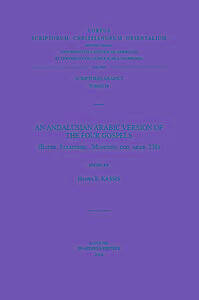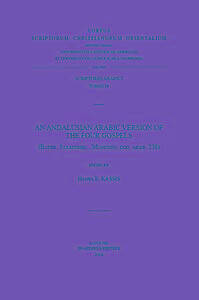
- Afhalen na 1 uur in een winkel met voorraad
- Gratis thuislevering in België vanaf € 30
- Ruim aanbod met 7 miljoen producten
- Afhalen na 1 uur in een winkel met voorraad
- Gratis thuislevering in België vanaf € 30
- Ruim aanbod met 7 miljoen producten
Zoeken
An N Andalusian Arabic Version of the Four Gospels
(Bayer. Staatsbibl., Munchen, Cod. Arab. 238)
He Kassis
€ 126,00
+ 252 punten
Omschrijving
Within one year of the conquest of Spania (AD 711), the Muslim conquerors struck coins, with legends in Latin, demonstrating the tenets of their faith: 'In the Name of God; there is no deity other than God, Alone, without compeer'. This proclamation was followed by a bilingual mint, drawn from the Qur'an: 'He is God, Unique, God Everlasting, He who has not begotten, and who has not been begotten, and equal to Him is not any one' (Qur'an 112). Then solely in Arabic, the coins replaced the legend Spania with al-Andalus. As the Christian population of Al-Andalus became increasingly arabicised, the need for translating their sacred scriptures into Arabic undoubtedly ensued. It is interesting to note that article 26 of the Fourth Council of Toledo (AD 633) had decreed that when priests were assigned to their districts (parishes), the bishops were to provide them each with a copy of the Gospels so that, having mastered the teachings of the Gospels, the priests would not err in the application of God's law and intent. An Arabic translation of the Scriptures - particularly the Gospels - would meet that requirement and satisfy a growing need of the priesthood and the faithful laity - non-conversant in Latin - to read and hear the sacred text in the language that they comprehended best.
Specificaties
Betrokkenen
- Auteur(s):
- Uitgeverij:
Inhoud
- Aantal bladzijden:
- 438
- Taal:
- Engels
- Reeks:
- Reeksnummer:
- nr. 663
Eigenschappen
- Productcode (EAN):
- 9789042933248
- Verschijningsdatum:
- 19/09/2016
- Uitvoering:
- Paperback
- Formaat:
- Trade paperback (VS)
- Afmetingen:
- 160 mm x 239 mm
- Gewicht:
- 716 g

Alleen bij Standaard Boekhandel
+ 252 punten op je klantenkaart van Standaard Boekhandel
Beoordelingen
We publiceren alleen reviews die voldoen aan de voorwaarden voor reviews. Bekijk onze voorwaarden voor reviews.











